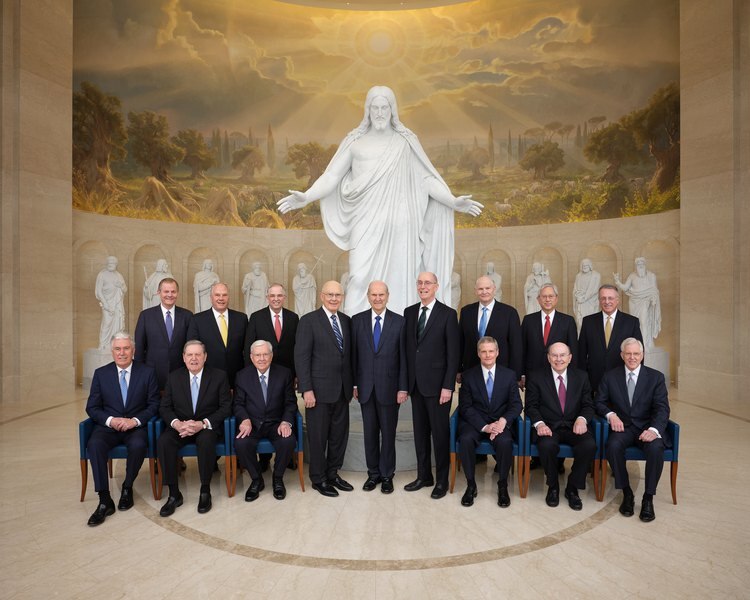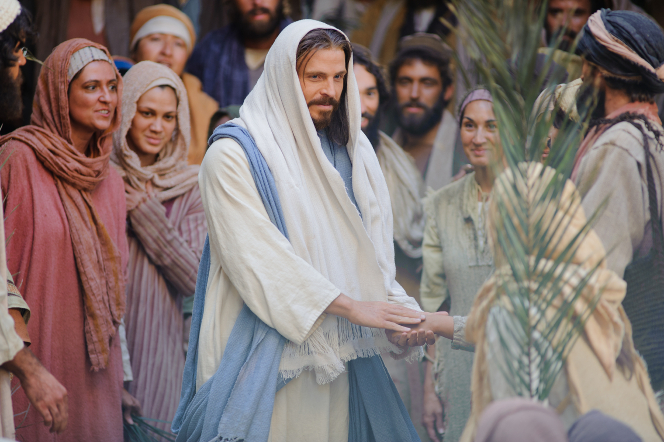
35 years ago today, actually yesterday, on February 15, 1985, I became a member of The Church of Jesus Christ of Latter-day Saints, that in those days was mostly known, in Italy, as the Mormon Church.
I don’t think that I had ever heard, or I couldn’t remember, at that point in my life, the true name of the Church. When I first saw a couple of missionaries of The Church of Jesus Christ of Latter-day Saints in the metro in Milan and I read the name of the church in their name tag, I was left wondering who they were. I had heard multiple time about the “Mormons”, but I didn’t know that those missionaries were from the same church, just with a different name.
Only a few months later, when a different couple of missionaries stopped me on the street, in my home town, Asti, I finally learned that Elder Forbes and his companion were what most Italians would call “Mormon Missionaries”.
I met Elder Forbes and his companion sometimes in December 1984, and I was baptized on February 15, 1985, after some ups and downs trying to convince my catholic family to let me become a member of the Church of Jesus Christ. One interesting fact is that almost no member of my family was a regular churchgoer, practicing catholic, like many others in Italy. My relatives seemed to have quite an open mind regarding religion, or the absence of it, but for some strange reason, to become a “Mormon” was not included in their open-mindedness.
My Conversion to the Church of Jesus Christ
I have written in the past about my conversion story. A simple version of it was actually published in the Liahona almost twenty years ago, after I had met in the São Paulo Temple Elder Ulisses Soares, who at the time was the Director of Temporal Affairs of the Church in Brazil.

I had never met him before, and I have never met him after. But at the time he was interested in finding stories from members of the church for the Liahona magazine. After I shared with him my conversion story, he invited me to write it down for publication, and I did it. The story was actually published a few years later, in the Liahona of February 2003, when I was already living in Utah.
A Few Things That I Have Learned in the Last 35 Years as a Member of the Church
Today, instead of writing again about my conversion story, I want to write about a few things that I have learned in these 35 years as a member of the Church. The challenge is to do it in relatively few words, but I will try.
Today I actually had an interesting experience, that confirmed that there may have been some value in starting to write this post yesterday, even if I only finished it today. Being the third Sunday of the month, today I was scheduled to give a talk in church, my monthly talk as a member of the stake high council, and the first time I would actually deliver that specific talk.
However, while I was reviewing it for the last time, only 30 minutes before church started, the computer screen suddenly became black and then “informed me” that it would have to install a critical update right away. Since I had cancelled the four previous requests to go through the process, the computer didn’t give me a choice and started the process, informing me that it would require up to 45 minutes.
I suddenly realized that my talk would probably still be unreachable when I needed it. Surely I could try to rely on memory and/or inspiration, but I decided to start considering a possible plan B. Perhaps what had just happened was for a purpose, and the Lord wanted me to give another talk. Then I remembered about this blog post, still unfinished, but with some good ideas that could help me organize a topic that I knew very well anyway: my conversion story and what I had learned in the last 35 years as a member of The Church of Jesus Christ of Latter-day Saints.
And so I did, I forgot about the lost talk, and focused on organizing my thoughts around the new topic. Thanks to the draft of this post (accessible through the phone), an obvious knowledge of my own life and some help from inspiration, I had actually a very spiritual experience and I delivered a talk that was probably better than what I had prepared.
It is harder to write than to talk, and what I have here in writing is not exactly what I said, but it’s along the same lines.
After talking briefly about my conversion story and my first years as a member of the church, I decided to focus on three things (now four in this writing) that I have learned and that may explain why some people leave the church, temporarily or forever.
Why Some People Leave the Church (and Many Others Don’t)

While the Church of Jesus Christ as an institution keeps growing, some of its members decide to stop attending Sunday meetings, and following some, or most, of the principles of the gospel. I have considered four reasons why this happens. There are surely many others, but these four are part of what I have learned in my 35 years as a member of the Church. They are:
- Not confessing the hand of the Lord in all things
- Not understanding and accepting the role of prophets and apostles in establishing true doctrine
- Trusting in the powers of reason more than in the spiritual gifts and revelation
- Expecting perfection from members and leadership (or themselves)
Not confessing (recognizing) the hand of the Lord in all things
I never left the Church after my baptism, but this doesn’t mean that I have not had challenges. Actually, I have had quite a few, but at the same time I have seen the hand of the Lord in my life, helping me, protecting me, teaching me, and sometimes even administering some correction. Always for my own good and progress.
I feel blessed that I have began to learn the principle explained in Doctrine and Covenants 59:21:
And in nothing doth man offend God, or against none is his wrath kindled, save those who confess not his hand in all things, and obey not his commandments.
I have never found myself in situations so difficult as those of the early Saints, when mobs were raging, family and friends were being murdered, and innocent Saints were being driven from their homes.
However, thanks to my own challenges, I have learned the importance of recognizing the hand of the Lord in what happens in our lives, even when what is happening is difficult to endure, or accept. I have learned that the Lord only does things for our own good, even if we often don’t really understand why.
We all naturally hope for good things and blessings in our lives, but we should not expect that all will always go well or be easy. We should always remember that challenges and hard times are part of our experience here on the earth.
However, apparently some people forget all of this, and erroneously assume that the blessings promised to the faithfuls will almost completely exonerate them from challenges and suffering. They assume an almost perfect protection from troubles because of their church membership. But this is not possible, and it would actually be strange, considering that the perfect Son of God actually suffered more than anybody else. Being the most righteous and favorite Son of God didn’t exempt Him from trials and opposition. Then why should we be exempted?
The Lord reminded a suffering Joseph Smith of this principle, when he was a prisoner in the Liberty jail:
If thou art called to pass through tribulation; if thou art in perils among false brethren; if thou art in perils among robbers; if thou art in perils by land or by sea … And if thou shouldst be cast into the pit, or into the hands of murderers, and the sentence of death passed upon thee …if the very jaws of hell shall gape open the mouth wide after thee, know thou, my son, that all these things shall give thee experience, and shall be for thy good.
The Son of Man hath descended below them all. Art thou greater than he?

Obviously Joseph Smith was not greater than the Savior, and neither are we. I am glad that the Lord has blessed me with at least some understanding of the principle that hard things need to happen in our lives.
I have gone through some seriously difficult times, but I have now developed a testimony of the principle that whatever the Lord does, or allows to happen in my life, it is always for my good, even when I cannot understand why.
I have learned that I need to make an effort to transform the challenge that I am facing into a stepping stone for personal progress, instead than into a stumbling block. It is not easy, and hopefully I will always have this same attitude and faith, in the future, when more difficult problems may arise, but at least I understand the principle. Unfortunately some people have not learned it yet.
Not understanding and accepting the role of prophets and apostles in establishing true doctrine

A second important principle, that is a stumbling block for some people, is about the role of prophets and apostles in establishing true doctrine.
As we learn in Ephesian 14: 11-15
And He Himself gave some to be apostles, some prophets, some evangelists, and some pastors and teachers …for the edifying of the body of Christ, till we all come to the unity of the faith and of the knowledge of the Son of God, to a perfect man, to the measure of the stature of the fullness of Christ; that we should no longer be children, tossed to and fro and carried about with every wind of doctrine, by the trickery of men, in the cunning craftiness of deceitful plotting,
Since my early days in the church I realized that it may had been a blessing, for me, not to be born as a member of the church, but to have had the opportunity to learn and experiment with different philosophies and doctrines, before learning about the Restored Gospel. Because of my previous experience and knowledge, when I was taught by the missionaries, I was ready to really appreciate what was being offered to me.
In the years that followed, I often noticed how some people would fall away from the church for not understanding some basic doctrinal principles, or for not appreciating what they had received. This applies to people who were raised in the church as much as to people who joined it later in life.
One of the most important principles of our religion is that we need apostles and prophets to teach us true doctrine and to point us toward the Savior, so that we are not “tossed to and fro and carried about with every wind of doctrine, by the trickery of men, in the cunning craftiness of deceitful plotting,“
Life is complex, and philosophies of men or of devils abound, and some of them are not too dangerous, but some really are, and if we follow them, we will lose our way. Political correctness and other social pressures can influence us to the point that we may decide that political figures, actors, teachers, or friends know more about the truth than the prophets of the Lord.
When we start to disregard the prophets’ counsel, we are in dangerous territory and it is just a question of time before we will leave the church, unless we change direction.
Trusting in the powers of reason more than in the spiritual gifts and revelation

The third problem I have noticed is related to the second, and actually in some cases may be the reason why many don’t understanding and/or accept the role of the prophets and apostles.
Some people have learned that the power of their reason is what differentiate them from the animal kingdom, but they have not yet understood that reason alone will not take them to the Celestial Kingdom.
In other words, while reason is a powerful tool of the human mind, inspiration and other spiritual gifts are superior and essential to obtain the faith necessary to salvation and eternal life.
When people trust their reason above anything else, they easily get deceived by people who are smarter than they are, or they even deceive themselves into believing what they like, what pleases them, or what is easier. Reason is powerful, but limited.
I am not suggesting here that men and women should ignore or discount the value of their intelligence and reason. What I am saying is that our own intelligence needs spiritual enlightenment and spiritual gifts to understand true spiritual realities. Through reason alone, we will never be able to prove the existence of God, but even more importantly, we will never be able to really know and understand Him.
Often in my life, the more reasonable course of action wasn’t necessarily the best. When I have followed the guidance of the Spirit of God, I have alway been better off, even if I wasn’t able to explain my choices in a “reasonable way” to others.
Inspiration transcend reason. Inspiration and revelation illuminate our minds and make them more powerful, but it looks more like poetry than philosophical deductions.
This is why, if we insist in following only our reason, we may end up reaching the wrong destination. We need to learn to connect with the Spirit of God, to make the right decisions in out lives. At times reason will be enough, but often, it will be not.
Expecting perfection from other members and church leadership (or themselves)
A fourth stumbling block for some people are unrealistic expectations about others members of the church, leaders, or even themselves.
To have lofty goals and aspirations is a good thing, but sometimes this can get out of hand, and it may start to become a serious hindrance to spiritual progress. Instead than focusing on perfection, we should focus on improving constantly; and instead than focusing on making sure that others are perfect, we should focus on ourselves.
We should accept that others are probably doing their best, even when they make mistakes. This is one of the reasons why forgiveness is so important. We all make mistakes, and if we become severe judges of others, including of the leadership of the church, we may end up losing the perspective of the plan of God. We are all here to learn, and some are probably very slow learners, but we all are slow and imperfect, when compared to the Savior anyway.
Many have fallen away from the church because they insist on pretending perfection from others. They are too easily offended when someone ignore them, or hurt them, or does something that they believe it’s wrong.
We all had some tough time with some other person at church, or in other situations, and it’s normal to struggle, to be resented, and even avoid a person for a time. But we shouldn’t let these feelings grow out of control to the point that we let them interfere with our church membership, and we lose the great blessings of the gospel, for some eternally insignificant matter.
Some people, on the other hand, need to be more patient with themselves, and learn to accept that they cannot be perfect in this life. We need to keep trying, but not let our “perfectionism” discourage us, when we inevitably face the fact that we are not yet what we would like to be.
This was not an exhaustive list of what I have learned or of why people leave the Church, and it different from what I shared today in sacrament meetings, but it doesn’t matter. It was a good exercise for me, and I hope that it will be of some value for at least a few readers, as it was for some of those who listened to the talk this morning, if I decide to believe those who approached me at the end.
For now it’s enough. Perhaps I will write more about this in five more year, for my 40th baptism’s anniversary!
